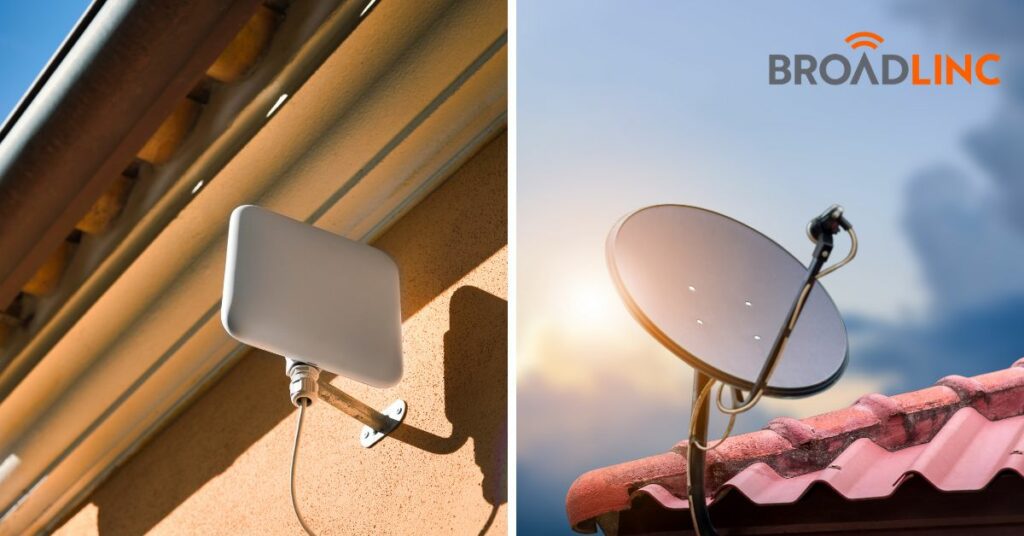
Fixed Wireless Internet vs. Satellite Internet
Two rural Internet options you have is fixed wireless Internet and satellite Internet. If you’re unfamiliar with either, you may not know the difference.
In short, fixed wireless Internet uses a radio tower, which sends a signal to a fixed point in your home. Meanwhile, satellite Internet transmits Internet signals from a satellite to a satellite dish receiver.
Of course, many other nuances exist between a satellite Internet service and a fixed wireless Internet service. Read on to learn which Internet service is right for you.
The Differences Between Fixed Wireless and Satellite Internet
A satellite Internet and a fixed wireless connection have many commonalities. Each Internet service provider type uses wireless technology that is picked up by a receiver. Both work well as rural Internet options when cable Internet or fiber is not available.
However, there are differences. Satellite Internet providers use, satellite technology. Satellite signals go from space to a satellite dish, providing Internet. Meanwhile, fixed wireless signals come from radio towers. A fixed wireless signal goes from the tower to a receiver, then is transmitted to a router.
Because of this, both have their advantages and disadvantages. Fixed wireless Internet can work well if you live in a home within a precise tower radius. Meanwhile, satellite can work well if you live in a secluded area or are on the road. Both satellite and fixed Internet have pros and cons, which we’ll get into later.
When it comes to fixed wireless Internet vs. satellite, you may wonder which is better for you. Both are broadband options for rural areas, so let’s discuss the advantages and disadvantages.
Advantages of a Fixed Wireless Internet Connection
Fixed wireless Internet providers use radio waves to bring the Internet to your home. But first, let’s look at why people choose fixed wireless services.
– Speed
Fixed wireless providers deliver faster Internet speeds. As long as your fixed wireless connection is in a 10-mile radius of the tower and there are no obstructions between the access point and your receiver, you can get download speeds up to 400 Mbps and upload speeds up to 50 Mbps.
With that said, fixed wireless Internet can vary widely depending on the location and your provider. When looking at a fixed wireless Internet provider, always ensure they can deliver faster. Read some reviews, see the averages, and don’t be afraid to ask questions.
– Cost
Fixed wireless providers tend to charge less. This is because installing a fixed wireless Internet connection is quick and affordable. In addition, fixed wireless companies offer various packages based on how many Internet and data caps you need, saving you money.
How much are you going to spend on average? It can depend on the fixed wireless Internet provider and how much you need, but most pay around $60 monthly. So compared to some providers, fixed wireless Internet can be affordable. However, you still get quality Internet service with every dollar.
– Reliability
For those living in a rural area, a fixed wireless connection provides more consistent speeds than a satellite Internet connection and a much faster speed than DSL. A good rural Internet option should be reliable. You don’t want the Internet to drop when you need it the most, such as during a crucial part of an online game, or when your 4K show is getting good.
However, it all depends on where you live. Fixed wireless Internet needs a clear line of sight; if you don’t have this, you may have to look elsewhere.
– Environmental Impact
Fixed wireless Internet service has become the more environmentally conscious option for some people. Fixed wireless Internet does not require physical cables and uses far less electricity, meaning that it produces less waste. Fixed wireless Internet needs a single tower and does not need to bury cables. Fixed wireless can be a better option with no fiber or cable lines.
Advantages of Satellite Internet
Like fixed wireless Internet, satellite Internet provides rural communities with faster, more reliable speeds.
– Availability
Since satellite Internet requires only a dish due to it beaming signals anywhere on Earth, one does not need to worry about it not being available. Therefore, satellite Internet options work well for those living in highly rural areas. In most cases, you can find someone to install a satellite dish or other wireless router in your home, meaning that you can access faster Internet speeds no matter where you are.
– Fewer Interruptions
While not perfect, a satellite service tends to have a consistent signal as long as it’s within clear sight. With that said, it can depend on where you live. Areas where you may experience storms often can fall victim to interruptions.
Disadvantages of Fixed Wireless Internet
With fixed wireless Internet vs. satellite, you must consider the disadvantages of both when you want to make a choice. Here is the disadvantage of fixed wireless services.
– Limited Coverage
Fixed wireless Internet can have impressive speeds and reliable service. One problem with fixed wireless Internet is that the point between your home and the radio tower must have no obstructions. If there are hills, trees, buildings, or other obstacles, your fixed wireless Internet connection may have slower speeds and higher latency.
In addition, you need to live in an area near a fixed wireless tower. If you don’t have an access point, then you can’t have fixed wireless, or you may have access to a slower version. So in the battle of fixed wireless vs. satellite, if you can get fixed wireless, fixed wireless wins. Ultimately, you can figure this out by looking up ISPs near you that offer fixed wireless or by checking for serviceability. If there aren’t any, then you may need to look elsewhere.
Disadvantages of Satellite Internet
Satellite Internet suffers from some problems as well. As you may expect, no Internet is perfect, and satellite does have several disadvantages. Let’s look at some of the major ones.
– High Latency
Unlike traditional cellular services, satellite Internet is not coming from Earth. Therefore, even though the Internet service uses signals at the speed of light, there can be high latency sometimes. This latency can increase if there are obstructions or during extreme weather.
You will notice this lag if your Internet usage consists of online gaming, streaming 4K video, or loading large web pages. With some providers, this latency prevents realtime communication such as voice over IP calling, videoconferencing, etc. While satellite Internet can have high download speeds, and Internet companies have been working to reduce latency, it can still be noticeable when it happens.
When choosing satellite Internet plans, you should also look at the company and its reputation. For example, do they often have interruptions, or is their technology better than other providers?
– High Cost
Satellite Internet providers can charge more than other broadband services. Of course, the price can depend on who you choose, where you live, and what plans you use. On average, satellite Internet costs around $110 monthly. This cost can be much more than other services, including fixed wireless Internet. However, the cost can be worth it if you live in an area where satellite Internet is your only option.
Also, it would be best if you considered the data cap. Some Internet plans offer data caps; if you go over them, your speed may be throttled, or you may pay more. Always discuss this before you choose a plan.
Conclusion
It all depends on what you need when it comes to fixed wireless vs. satellite.
A fixed wireless service uses radio waves to deliver high-speed Internet, which can be fast. However, the disadvantage of fixed wireless Internet is that you need a clear or near line of sight. If your home is in a forest or a hilly area, fixed wireless Internet may not be possible.
Satellite Internet is excellent if you live in a secluded area without Internet services. While you have to deal with high latency and weather issues, it can be a good choice if there is nothing else available.
Ultimately, both fixed wireless Internet and satellite are both excellent options. It may go down to where you live, what you need, and what’s available.
We hope this article was helpful to you. While living in a rural area can be a hassle for broadband Internet, things are changing. It’s now possible for you to get faster Internet, and both satellite and fixed wireless Internet are to thank for that.

Written By Brittany Derderian, Director of Marketing
Brittany Derderian is the Director of Marketing at Broadlinc internet services. Her responsibilities include leading the company’s marketing efforts, overseeing and growing the marketing department, consistently identifying revenue opportunities within our established client base and managing consistent growth by securing new accounts, collaborating with the leadership team to uncover insights and strategies to develop and implement marketing and branding strategies for new and existing products, and spearheading the strategic and tactical execution of marketing campaigns, including design of test/control segmentation, implementation of tests, tracking, results reporting, analysis, and recommendations. You can find her on the weekends enjoying the outdoors of Colorado with her husband, Logan Derderian.